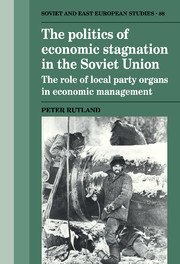 The Politics of Economic Stagnation in the Soviet Union
The Politics of Economic Stagnation in the Soviet Union Book contents
- Frontmatter
- Contents
- List of tables
- Preface
- Glossary of Russian terms and abbreviation
- Introduction: The party in the post-totalitarian system
- 1 The party and the economy: structures and principles
- 2 Party interventions in industry
- 3 Interventions in industry: case studies
- 4 The party as regional coordinator
- 5 Regional coordination: case studies
- 6 The party as fireman: party interventions in the transport and energy sectors
- 7 The role of the party in agriculture
- 8 Non-party control organs
- 9 The principles underlying the party's work with cadres
- 10 The obkom elite in the 1980s
- 11 Party and economy under perestroika
- Conclusion Party and economy in the USSR: from stagnation to collapse
- Appendices
- Notes
- Bibliography
- Index
- THE POLITICS OF ECONOMIC STAGNATION IN THE SOVIET UNION
6 - The party as fireman: party interventions in the transport and energy sectors
Published online by Cambridge University Press: 06 July 2010
- Frontmatter
- Contents
- List of tables
- Preface
- Glossary of Russian terms and abbreviation
- Introduction: The party in the post-totalitarian system
- 1 The party and the economy: structures and principles
- 2 Party interventions in industry
- 3 Interventions in industry: case studies
- 4 The party as regional coordinator
- 5 Regional coordination: case studies
- 6 The party as fireman: party interventions in the transport and energy sectors
- 7 The role of the party in agriculture
- 8 Non-party control organs
- 9 The principles underlying the party's work with cadres
- 10 The obkom elite in the 1980s
- 11 Party and economy under perestroika
- Conclusion Party and economy in the USSR: from stagnation to collapse
- Appendices
- Notes
- Bibliography
- Index
- THE POLITICS OF ECONOMIC STAGNATION IN THE SOVIET UNION
Summary
Transport and energy both represented important building blocks of the Soviet economy. They loomed large in the economic work of local party organs over the last ten years of the Brezhnev era, for two main reasons. First, both ran into severe (and largely unexpected) problems, such that they became bottlenecks holding back the overall development of the economy. One can argue that it was problems in these two sectors which largely caused the levelling off in economic growth which occurred after 1978.
Second, both transport and energy were difficult to plan and administer from a single centre. They involved activities scattered over huge distances, and called for a high level of organizational coordination, both spatial and temporal. Both sectors developed problems by the late 1970s – an overload of the transport infrastructure, and unexpected difficulties in expanding oil production in West Siberia.
In response to these problems, the Soviet leadership adopted a two-pronged approach, throwing massive amounts of additional investments into these sectors and mobilizing party organizations for a classic ‘fireman’ type campaign.
Transport and energy are obviously very complex subjects in their own right: this short chapter can only scratch the surface of their problems. In the transport sector, the chapter will concentrate on the two most prominent party campaigns of the period: the drive to improve the performance of the railways, mainly by mobilizing industrial plants to build railway wagons; and the campaign to build the Baikal–Amur Mainline railway (BAM), opening up new areas of eastern Siberia.
- Type
- Chapter
- Information
- The Politics of Economic Stagnation in the Soviet UnionThe Role of Local Party Organs in Economic Management, pp. 123 - 141Publisher: Cambridge University PressPrint publication year: 1992


